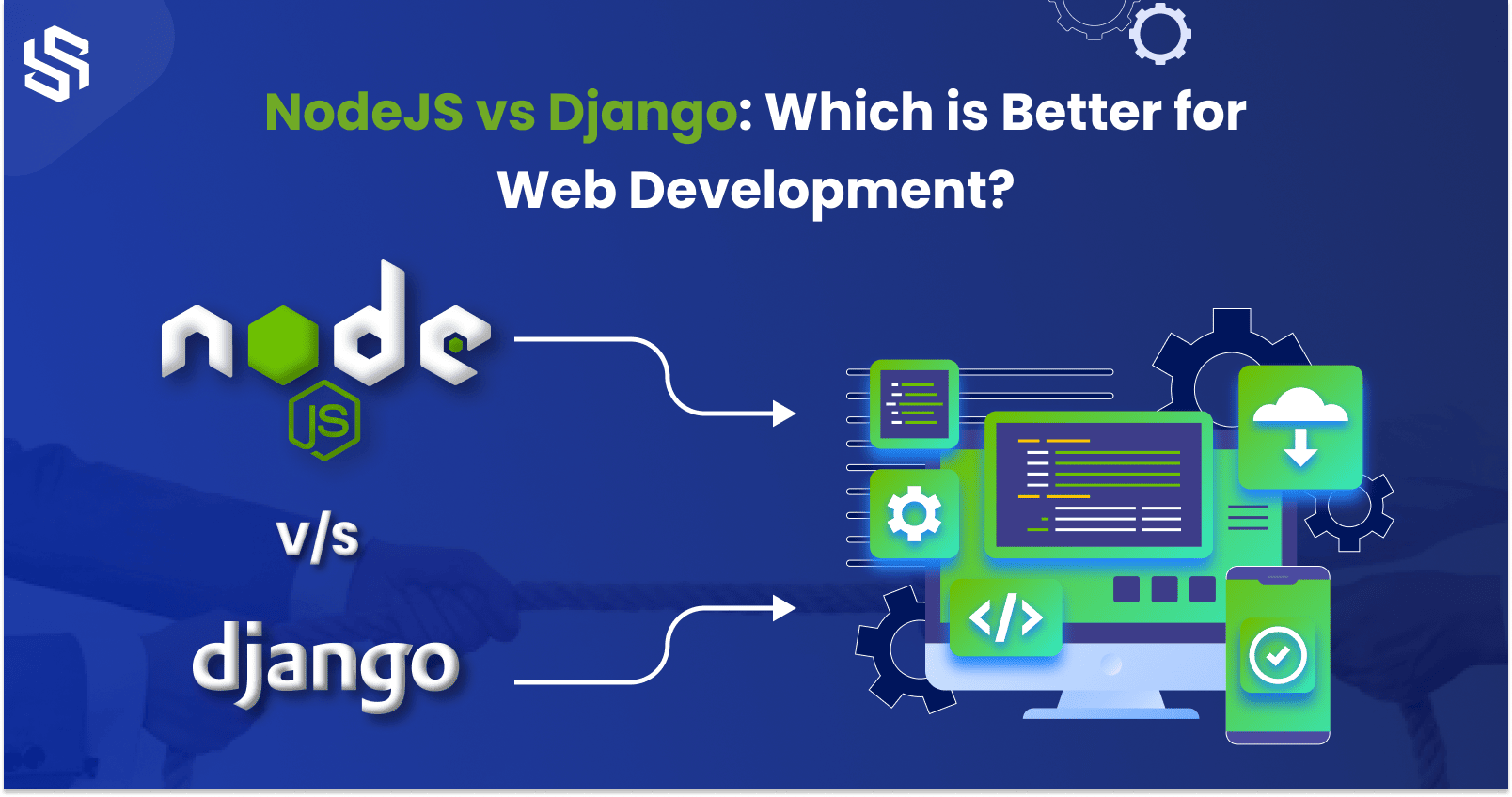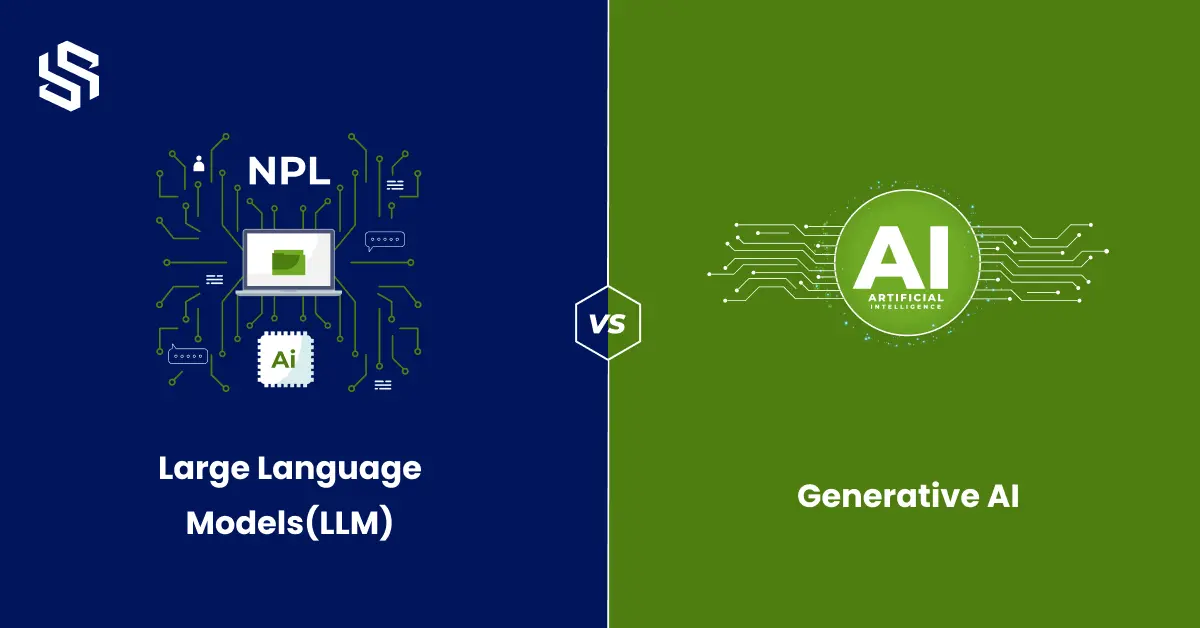Any website or web application must deliver a superior user experience to be successful. But what determines the quality of a platform? Is it more complex than just the user interface? It turns out that a robust backend infrastructure is equally crucial in ensuring a user-friendly experience.
What tasks does the backend handle? How does it improve the platform’s performance? Let’s delve deeper into this. The backend is responsible for critical functions like data processing, business logic implementation, and database management. As the platform’s backbone, it enables smooth communication between the front end and server, thus increasing platform productivity.
Now comes the challenging part: choosing the right technology stack for backend development. Two highly sought-after options are NodeJS vs Django. But how can we determine which is superior? Both offer particular advantages and disadvantages that need to be considered.
To better understand their applicability for various backend development scenarios, let’s take a closer look at Django vs Nodejs. Are you ready to look into these powerful technologies?
NodeJS vs Django: An Overview
Businesses in today’s fast-paced digital landscape prioritize speedy development and delivery of web apps, seeking efficient methods to accelerate their time-to-market. NodeJS and Django are powerful web development frameworks that speed up and simplify development processes to facilitate the creation of dynamic online apps more quickly.
NodeJS is a client-side web app development framework developed using JavaScript. It offers developers an edge by using one language throughout an application’s stack – improving developer productivity by using their existing JavaScript knowledge instead of switching between several.
Django, as a high-level Python web framework, emphasizes rapid development to assist web developers with building applications more quickly and within schedule. It provides a comprehensive set of tools and libraries, streamlining the development process and allowing developers to focus on implementing specific features rather than reinventing the wheel.
NodeJS and Django are two highly sought-after technologies in the modern tech industry. Here we compare NodeJS vs Django in detail so that you can understand their characteristics better and choose which option aligns better with your project requirements.
Let’s delve deeper and examine NodeJS in depth.
It’s decision time in the world of web development. Node.js or Django – which one will you choose?
Secure a comprehensive proposal catered to your project’s requirements. Our professionals are geared up to assist you on the path to greatness.
What is NodeJS?
Node.js is a powerful runtime environment for executing JavaScript code outside of web browsers. It has gained significant popularity among developers, with a large community and numerous contributions.
Node.js has the ability to build fast, productive, and efficient web applications. It operates on both the client-side and server-side, providing versatility for developers. Node.js is particularly renowned for its flexibility, scalability, and impressive performance, making it a preferred choice for backend development.
It’s crucial to evaluate Node.js’s advantages and match them with your unique requirements when thinking about using it for your web development project. The extensive ecosystem and libraries available for Node.js contribute to its versatility and enable developers to build robust applications. The event-driven, non-blocking I/O mechanism used by Node.js further improves its effectiveness and responsiveness.
Ultimately, the suitability of Node.js hinges on your project requirements and your familiarity with JavaScript. You may develop dynamic, scalable, and customized online solutions that meet and go beyond your expectations by utilizing the benefits of Node.js.
We’ll go further into Node.js’s key features to see how they distinguish it from competing frameworks and make it a top option for web development.
Key Features of NodeJS
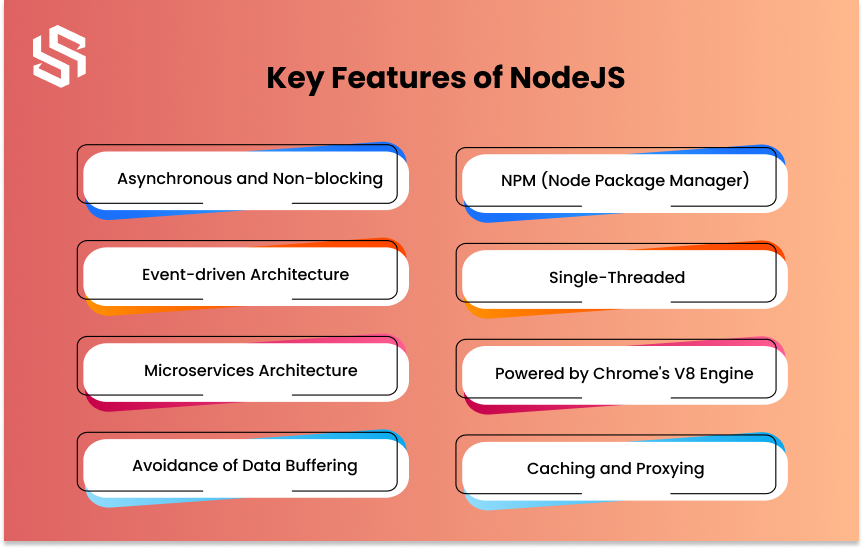
A popular and effective framework for web development, Node.js provides a wide range of essential capabilities. Let’s explore some of its standout features below.
- Node.js uses event-driven architecture for efficient handling of multiple concurrent operations.
- Node.js includes NPM, a powerful package manager for easy code management and reusability.
- Node.js uses a single thread of execution, making it lightweight and resource-effective for managing many requests.
- Creating modular microservices-based architecture is a good fit for Node.js.
- For quick server-side JavaScript execution, Node.js makes use of the powerful V8 engine.
- Node.js enables real-time data processing and transmission without buffering.
- Node.js can serve as a caching and proxy server, improving performance and reducing backend server load.
- Node.js can serve as a caching and proxy server, improving performance and reducing backend server load.
Advantages of NodeJS
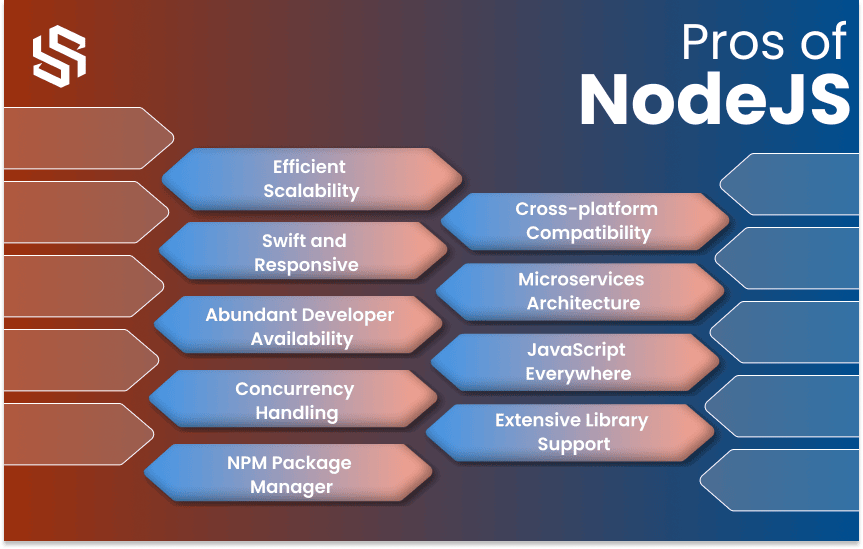
Node.js is a popular choice for web development due to the number of benefits it provides. The following are some benefits of utilizing Node.js in web development:
- Node.js efficiently handles concurrent requests, ensuring optimal performance under heavy loads.
- Node.js delivers impressive speed and responsiveness thanks to its asynchronous architecture and non-blocking operations.
- Node.js benefits from a large JavaScript developer community, facilitating collaboration and support throughout development.
- Node.js efficiently manages concurrent requests using event-driven, callback-based techniques, avoiding the need for additional threads or processes.
- Node.js has a vibrant ecosystem of open-source modules and libraries, which is backed by the extensive Node Package Manager (npm).
- Node.js utilizes npm for streamlined dependency management and easy integration of third-party libraries, promoting code reuse.
- Runs on Windows, macOS, and Linux, facilitating multi-platform application development.
- Well-suited for building scalable and distributed systems using independent services.
- It uses JavaScript for both client-side and server-side development, improving productivity and code reuse.
Disadvantages of NodeJS
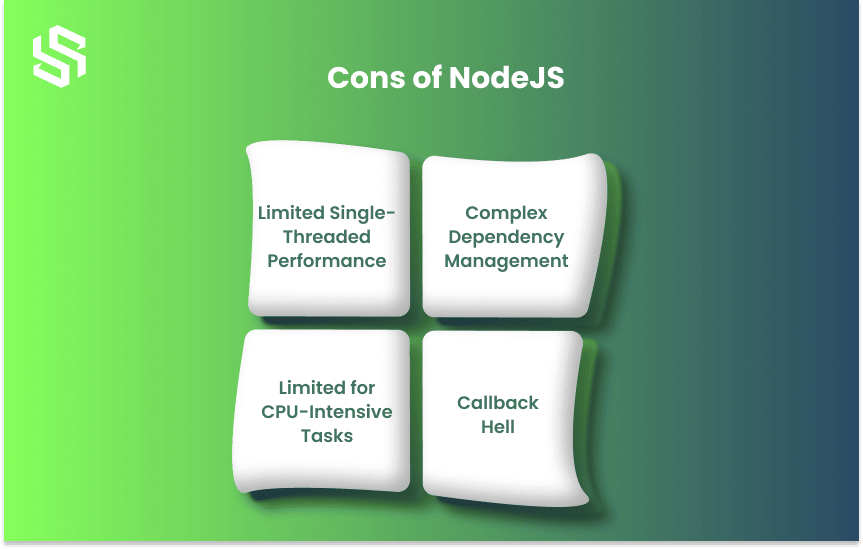
Node.js provides a lot of benefits, but there are also some drawbacks to take into account. The following are some drawbacks of utilizing Node.js in web development:
- Node.js may face challenges in efficiently utilizing multi-core processors, necessitating additional strategies for scaling across multiple cores.
- In Node.js, nested callbacks can make code more difficult to comprehend and maintain when performing sophisticated asynchronous tasks.
- Due to its single-threaded design, Node.js may have trouble processing complex computational operations effectively.
- Managing dependencies in Node.js projects, especially in larger ones, can be complex and lead to compatibility issues with different versions and conflicting dependencies among modules.
Use cases of NodeJS
Node.js is a versatile runtime environment that finds application in various domains. Some common use cases include:
- Real-time Applications
- API Development
- eCommerce Applications
- Streaming Applications
- Command Line Tools
- I/O Bound Applications
- Proxy Servers
- Streaming Applications
Clarity awaits – whether you should choose Node.js or Django for your web development project, Contact us for a clearer perspective.
What is Django?
Due to its open-source nature and cross-platform interoperability, developers frequently employ Django, a well-liked Python-based web development framework. It provides a more efficient web development method by doing away with tedious procedures and solving typical development issues.
The Django framework simplifies the development process by providing features like content management and user authentication, reducing the burden on developers.
Model-View-Template (MVT) architecture is used by Django, where the Model denotes business logic, the View is made up of user interface elements, and the Template is made up of static HTML elements with syntax for incorporating dynamic information. This design guarantees a distinct separation of interests and encourages rapid development.
Django supports the Django REST Framework and its basic capabilities, enabling the development of RESTful APIs for easy data movement between databases and interfaces. This further simplifies web development by providing a standardized approach to database communication.
Django’s comprehensive features, strong community support, and successful adoption by prominent businesses make it a favorable choice for web development projects.
Now, let’s explore the notable features of the Django framework:
Key Features of Django
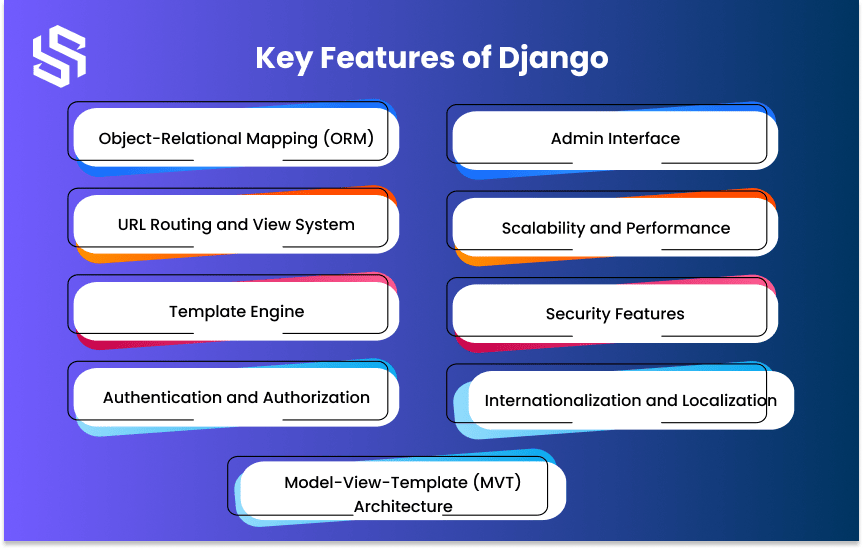
A well-liked web framework, Django provides a number of potent features that speed up and strengthen web development. Django’s main features include:
- Simplifies database management with Python code.
- Maps URLs to views/functions for clean URL structures.
- Creates dynamic and reusable HTML templates with template inheritance.
- Robust system for user authentication and access control.
- Automatic and customizable interface for managing application data.
- Built-in caching, database connection pooling, and optimization tools.
- Protection against common security threats and secure password handling.
- Supports translation and adaptation to different languages and regions.
- Django follows MVT architecture, separating logic into models, views, and templates for modularity and maintainability.
Advantages of Django
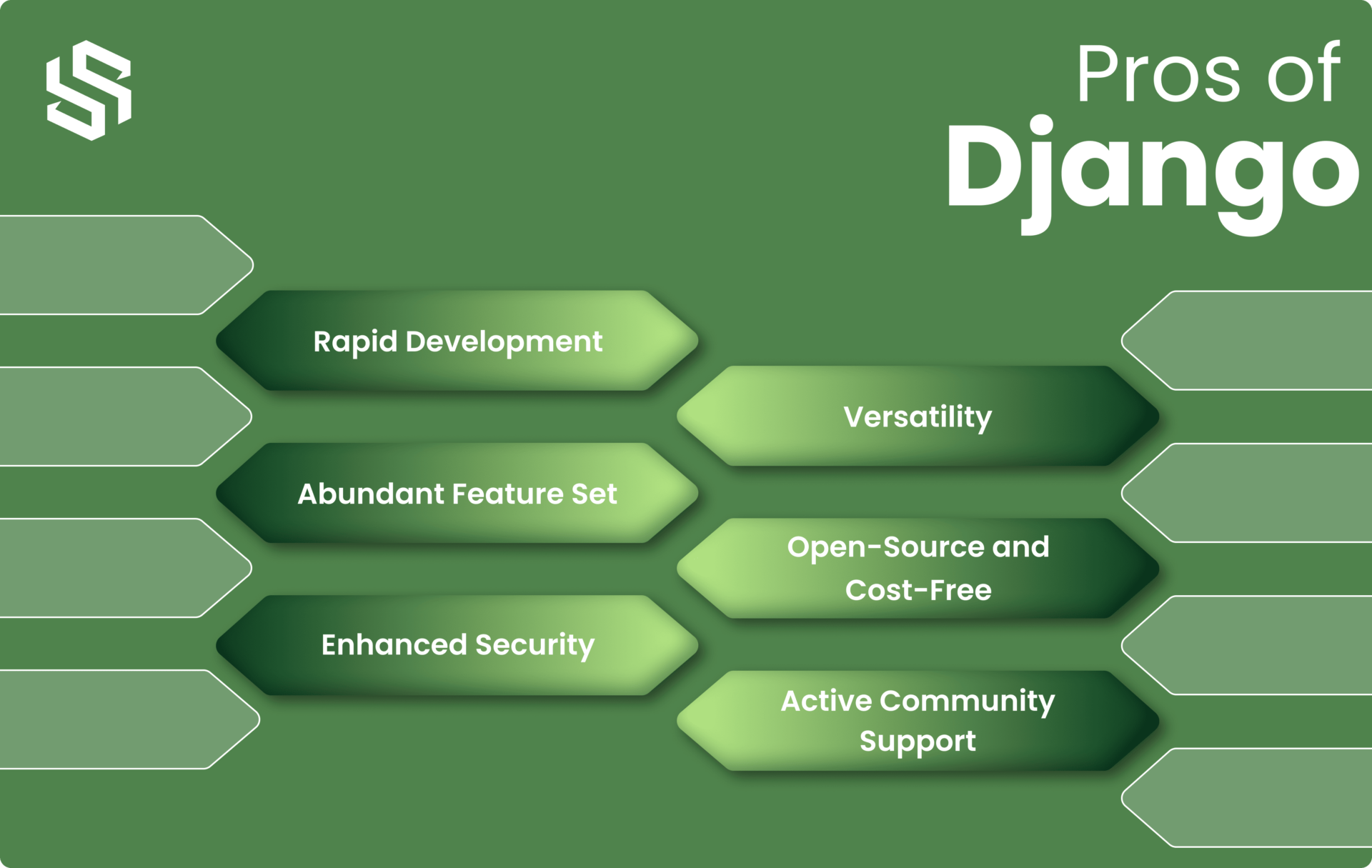
Django provides numerous advantages for web development projects. Some of the key advantages of Django include:
- Efficient web solution development with Django’s fast capabilities.
- Simplified web development tasks with Django’s abundant built-in features.
- Priority on security with robust features for web application protection.
- Versatile framework for diverse application types and industry needs.
- Cost-effective choice for web development projects with Django’s open-source nature.
- Supportive developer community for Django’s open-source framework.
Disadvantages of Django
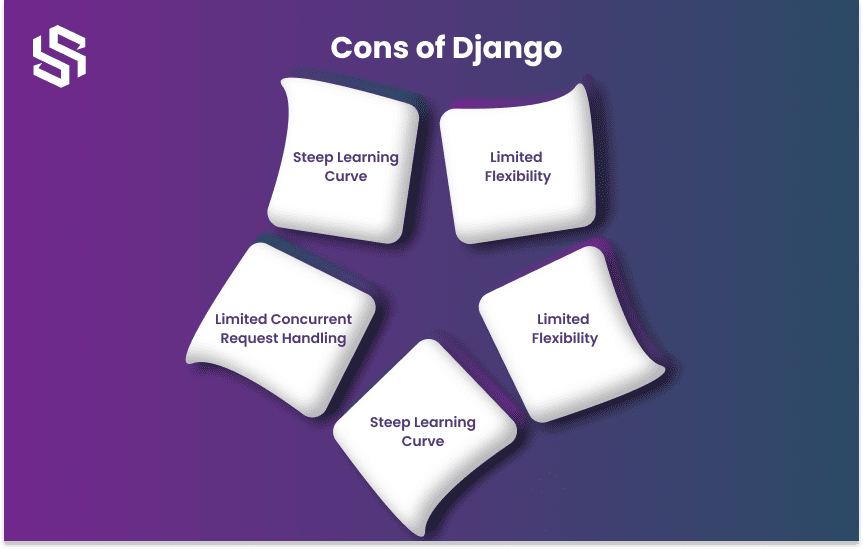
Django is a well-liked and effective web framework, but there are certain limitations and drawbacks that programmers should be aware of. The following are some of the main drawbacks of Django:
- It may be too complex for more straightforward applications.
- Limited Suitability for Small-Scale Solutions
- Django’s opinionated approach may restrict customization.
- Django’s monolithic architecture can hinder component decoupling and flexibility.
- Django’s default configuration may result in performance issues under high traffic.
Use cases of Django
Django is a versatile web framework that can be used for various types of applications. Some common use cases of Django include:
- Content Management Systems (CMS) Development
- Minimum Viable Product (MVP) Development
- Social Networks and Community Platforms
- E-commerce Websites
- Data-driven Applications
- Enterprise Applications
- SaaS Applications
- ulti-user Role-based Applications
Django vs NodeJS: Key Differences and Comparison
Django and Node.js are both widely used web development frameworks that provide different approaches to building web applications. When selecting one of these frameworks, it’s crucial to comprehend their variations. Consider the following significant variations:
Django vs NodeJS: Programming Language
Django is built using Python, a versatile and readable programming language. It has a large community and offers libraries for enhanced productivity. Python’s syntax emphasizes readability and is ideal for building complex applications. Django leverages Python’s rich ecosystem, including scientific computing and machine learning support.
Node.js is based on JavaScript, a programming language widely used in web browsers. JavaScript may be used for server-side development using Node.js. JavaScript’s event-driven and asynchronous characteristics make it perfect for scalable and real-time applications. JavaScript’s popularity has resulted in a wide ecosystem of libraries and tools. Sharing JavaScript code between the front and back ends simplifies development and code reuse.
Django vs NodeJS: Architecture
Model-View-Template (MVT) architecture, which offers a systematic method for creating web applications, is used by Django. Django enables developers to work freely on various project elements, including models, views, and templates. Code is more modular and manageable due to the separation of labor since changes to one component do not affect the other.
Node.js’s primary purpose is to run JavaScript code outside of the browser, which makes it possible to construct server-side software and create scalable web applications. Node.js is suited for high-end applications because of its single-threaded, event-driven architecture, enabling it to manage many requests quickly and effectively.
Django acts as a complete web framework for creating web applications, whereas Node.js concentrates on providing an environment for JavaScript code execution. Node.js excels in handling concurrent requests and offers flexibility in choosing architectural patterns, while Django’s MVT architecture promotes code organization and modularity.
If speed and functionality matter to you, then Node.js is your answer.
Hire our Node.js developers to create dynamic, real-time web apps that stand out.
Django vs NodeJS: Performance
When compared to Node.js, Django’s performance might be somewhat slower. Because requests are handled by a single flow in Python, there may be considerable overhead, especially when dealing with busy or computationally demanding jobs. It’s crucial to remember that Django provides a number of optimization and speed enhancement strategies, including query optimization and caching, to alleviate any performance restrictions. Varnish is an example of an external solution that may be used to improve the speed and functionality of Django applications.
With its event-driven, single-threaded design, Node.js excels at managing real-time and high-concurrency applications. Its non-blocking I/O operations enable it to handle several requests simultaneously quickly, leading to excellent performance and responsiveness. Data interchange between the two is easy since JavaScript is used for both the front end and back end, eliminating the requirement for data transformations. Regular version upgrades for Node.js have also helped it perform better over time.
Django’s performance can still be enough for many applications, even though Node.js often delivers faster and more scalable performance. This is especially true when appropriate optimization techniques are used.
Django vs NodeJS: Scalability
Regarding scalability, Django and Node.js can handle substantial amounts of data and heavy traffic, making them suitable for building scalable web applications.
Additionally, Django is capable of managing high levels of traffic and data. It has tools for database optimization, efficient request processing, and caching. Django uses a WSGI server and a process-based design to manage multiple concurrent requests efficiently. However, compared to Node.js, Django may need extra setup and infrastructure considerations for high scalability, requiring load balancers or deploying on many servers.
Node.js is highly scalable due to its event-driven, non-blocking I/O model, allowing it to handle numerous concurrent connections without blocking the application. Multiple requests may be processed simultaneously because of its single-threaded design. To provide developers more control over scalability, the vast library ecosystem includes solutions for load balancing, clustering, and microservices.
Django vs NodeJS: Security
The security of web applications is a top priority for Django, which also provides strong functionality. Cross-site scripting (XSS), cross-site request forgery (CSRF), and SQL injection threats are all protected against methods that are already integrated into the system. Developers may lessen these risks by using Django’s security capabilities, such as query parameterization and automated HTML escape. Additionally, Django follows best practices for password hashing and authentication, providing a strong foundation for user authentication and authorization.
Node.js, being a flexible and lightweight framework, relies on external libraries and modules for security. Although Node.js does not mandate any particular security procedures, developers can use third-party modules to handle security issues. To improve application security, the Node Package Manager (NPM) provides a variety of security-related modules. To protect the security of their apps, Node.js developers must be alert and stay up to speed with the most recent security upgrades and best practices.
Django and Node.js have active communities regularly releasing updates and security patches to address vulnerabilities. In terms of offering a more secure development environment right out of the box, Django has an advantage because of its built-in security features and adherence to security best practices.
Django vs NodeJS: Cost
Django, being open-source and built on Python, offers cost savings with its free availability and extensive community support. Its comprehensive features reduce development time and effort, leading to potential cost savings. However, advanced features may require paid services or third-party integrations.
Node.js, also open-source and based on JavaScript, benefits from the free availability of the JavaScript ecosystem. Its wide range of open-source libraries and community-driven support contribute to its cost-effectiveness. However, specialized services or premium support may come at an additional cost.
The cost of a web application development project goes beyond the framework itself. Other factors such as hosting, infrastructure, third-party services, and ongoing maintenance should also be considered.
Django vs NodeJS: Ecosystem and Community
Django has a sizable, active community and a thriving ecosystem. It benefits from the huge Python ecosystem, which has a variety of libraries, modules, and tools, as an open-source framework based on Python. The Django community offers a wealth of resources, support, and documentation, making it simpler for developers to exchange expertise and find answers. The ecosystem also contains community-developed integrations and third-party packages that further enhance Django’s functionality.
Node.js benefits from the enormous JavaScript ecosystem, which provides a wide range of libraries, frameworks, and tools because it is built on JavaScript. The Node.js community is renowned for its lively interaction, with engineers frequently submitting new modules and imparting their knowledge. Web development, serverless computing, and IoT applications are just a few of the use cases for which the ecosystem offers solutions.
Conclusion
In the epic battle of web development frameworks, NodeJS and Django have both showcased their remarkable strengths. As we draw this showdown to a close, it’s evident that both options possess unique qualities that cater to different needs and preferences.
But there’s no one-size-fits-all answer in this showdown. The choice between Node.js and Django hinges on your project’s unique requirements and your team’s expertise. If you’re aiming for real-time applications, NodeJS development might be your champion, while Django shines in scenarios where a comprehensive toolkit and speed of development are paramount.
If you’re still unsure about which path to take, Syndell is here to help. As leading NodeJS development company, we specialize in creating tailored solutions that align with your objectives. Our expert team of Node.js developers stands ready to turn your ideas into reality, delivering top-notch applications that elevate your online presence.
To make the right decision for your project, contact us at Syndell. Our professionals are equipped to guide you through the decision-making process, ensuring that your web development journey leads to success. Whether you’re leaning towards Node.js, Django, or need personalized advice, Syndell is your partner in crafting exceptional digital experience
FAQs
The choice between Node.js and Django depends on your specific requirements. Node.js is well-suited for building fast and scalable web applications, while Django offers a comprehensive framework for rapid development and a rich ecosystem for backend development.
Django is primarily designed for backend development, but it also provides a templating system for generating dynamic HTML. However, for more complex frontend development, it is common to use Django in combination with frontend frameworks like React or Angular.
Django and Node.js have different strengths and use cases. While Django is a robust backend framework, Node.js is known for its event-driven, non-blocking I/O model. The choice between the two depends on your project requirements and preferences.
Whether to migrate from Django to Node.js depends on several factors such as your project’s specific needs, team expertise, and scalability requirements. Evaluate the advantages and disadvantages of both frameworks and consider the impact on your project before making a decision.
Yes, it is possible to use Node.js and Django together in the same project. For example, you can use Node.js for building the backend API or handling real-time communication, while Django can be used for server-side rendering, managing the database, or providing administrative interfaces. The choice depends on the specific requirements and architecture of the project.


